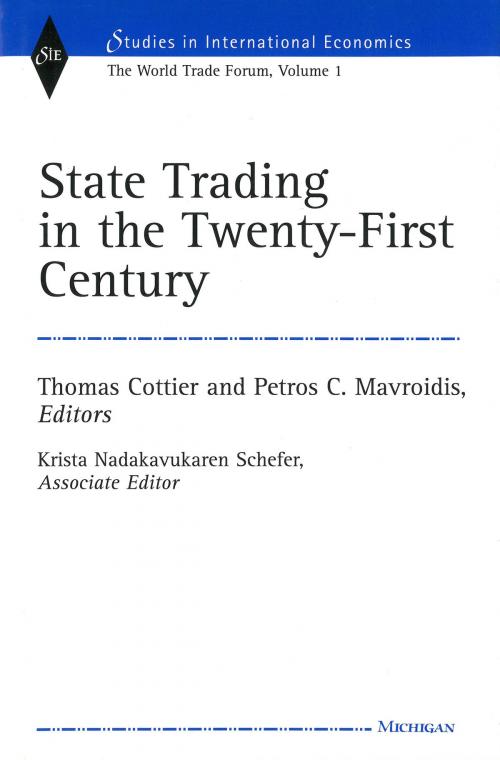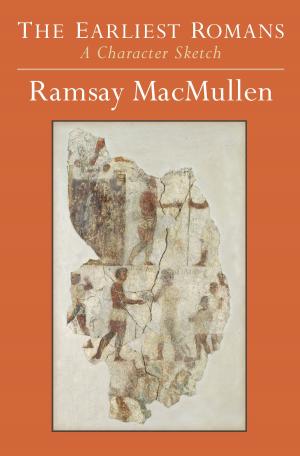State Trading in the Twenty-First Century
The World Trade Forum, Volume 1
Business & Finance, Economics, International Economics, Nonfiction, Social & Cultural Studies, Political Science| Author: | ISBN: | 9780472026456 | |
| Publisher: | University of Michigan Press | Publication: | May 6, 2010 |
| Imprint: | University of Michigan Press | Language: | English |
| Author: | |
| ISBN: | 9780472026456 |
| Publisher: | University of Michigan Press |
| Publication: | May 6, 2010 |
| Imprint: | University of Michigan Press |
| Language: | English |
The University of Michigan Press is pleased to announce the first volume in an annual series, The World Trade Forum. The Forum's members include scholars, lawyers, and government and business practitioners working in the area of international trade, law, and policy. They meet annually and discuss integration issues in international economic relations, focusing on a new theme each year.
The central topic of the first World Trade Forum is state trading. To what extent has trade liberalization, as we have experienced it over the last fifty years, affected property ownership? Contributors to the 1998 World Trade Forum explore this question, examining both state practice and the regulatory framework. Their discussions are divided into three parts: Part 1 looks at the World Trade Organization's legal framework for state trading enterprises, taking on such issues as monopolies and state enterprises, the WTO Antidumping Agreement and the economies in transition, and relationship of state trading and the Government Purchasing Act. Part 2 deals with regional experiences in state trading (for the EC, United States, Canada, Japan, China, and Russia). Part 3 examines conceptual issues such as auctions as a trade policy instrument and rule-making alternatives for entities with exclusive rights. The conclusion synthesizes the foregoing chapters in discussing the reach of modern international trade law.
Contributors are Frederick Abbott, Ichiro Araki, Christian Bach, Jacques H. J. Bourgeois, Thomas Cottier, William J. Davey, Vladimir Dbrentsov, Toni Haniotis, Bernard M. Hoekman, Gary Horlick, Henrik Horn, Robert Howse, Patrick Low, Will Martin, Mitsuo Matsushita, Petros Mavroidis, Aaditya Mattoo, Patrick Messerlin, Constantine Michalopoulos, Kristin Heim Mowry, Stilpon Nestor, Damien Neven, N. David Palmeter, Ernst-Ulrich Petersmann, André Sapir, Diane P. Wood, and Werner Zdouc.
Petros Mavroidis is Professor of Law, University of Neuchatel. Thomas Cottier is Professor of Law, Institute of European and International Economic Law, University of Bern Law School.
The University of Michigan Press is pleased to announce the first volume in an annual series, The World Trade Forum. The Forum's members include scholars, lawyers, and government and business practitioners working in the area of international trade, law, and policy. They meet annually and discuss integration issues in international economic relations, focusing on a new theme each year.
The central topic of the first World Trade Forum is state trading. To what extent has trade liberalization, as we have experienced it over the last fifty years, affected property ownership? Contributors to the 1998 World Trade Forum explore this question, examining both state practice and the regulatory framework. Their discussions are divided into three parts: Part 1 looks at the World Trade Organization's legal framework for state trading enterprises, taking on such issues as monopolies and state enterprises, the WTO Antidumping Agreement and the economies in transition, and relationship of state trading and the Government Purchasing Act. Part 2 deals with regional experiences in state trading (for the EC, United States, Canada, Japan, China, and Russia). Part 3 examines conceptual issues such as auctions as a trade policy instrument and rule-making alternatives for entities with exclusive rights. The conclusion synthesizes the foregoing chapters in discussing the reach of modern international trade law.
Contributors are Frederick Abbott, Ichiro Araki, Christian Bach, Jacques H. J. Bourgeois, Thomas Cottier, William J. Davey, Vladimir Dbrentsov, Toni Haniotis, Bernard M. Hoekman, Gary Horlick, Henrik Horn, Robert Howse, Patrick Low, Will Martin, Mitsuo Matsushita, Petros Mavroidis, Aaditya Mattoo, Patrick Messerlin, Constantine Michalopoulos, Kristin Heim Mowry, Stilpon Nestor, Damien Neven, N. David Palmeter, Ernst-Ulrich Petersmann, André Sapir, Diane P. Wood, and Werner Zdouc.
Petros Mavroidis is Professor of Law, University of Neuchatel. Thomas Cottier is Professor of Law, Institute of European and International Economic Law, University of Bern Law School.















